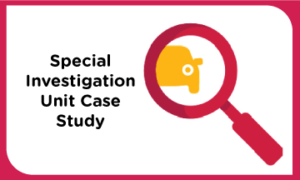According to a 2022 study by the Coalition Against Insurance Fraud (CAIF), auto theft insurance fraud costs U.S. Consumers $7.4 billion annually. Maryland Auto is committed to preventing fraudulent claims by implementing measures to ensure that payments are made only on legitimate claims. When fraud is suspected, claims are sent to our Special Investigations Unit (SIU) for further examination.
Maryland Auto recently investigated a theft claim that was reported in Prince George’s County. The policyholder explained that on the day of the theft, she commuted to work using public transportation due to insufficient employee parking. Upon returning from work, she discovered her car was missing from its parking space. She stated that she contacted the Prince George’s County Police and filed a report for the theft over the phone. The policyholder also told the adjuster that she possessed the only transponder key to the vehicle.
This theft occurred just a few weeks after the policy inception, which was considered a suspicious loss indicator, or “red flag,” and prompted the claim adjuster to refer the file to the SIU team for further investigation.
The SIU Investigator conducted an Examination Under Oath (EUO) with the policyholder to gather more details about the alleged theft. During the EUO, she disclosed that her vehicle had been a target of a prior vandalism and theft attempt a few months before this claim. There was no video footage available, due to an inoperative surveillance camera system at her apartment complex. Her previous auto insurance carrier had denied the claim.
At the time of the incident, the policyholder was unemployed, and had fallen behind on two months of loan payments on the car. However, the policyholder confirmed that she was working with her lienholder and that the loan was not in default, so the vehicle was not being repossessed.
After further investigation, the SIU investigator located the car on Peabody Street in West Hyattsville through a tag trace. The location of the vehicle recovery is significant, as the policyholder had previously resided in the area. When asked if she knew where Peabody Street was, she evaded the question before responding that she lived there in 2015 with a former boyfriend. Upon reaching the vehicle’s location, the investigator spoke with a neighbor who revealed that the insured car had been there for about two months. The vehicle had a steering wheel lock, and the ignition showed evidence of tampering. There was also an open driver’s window covered in plastic and damages to the exterior of the passenger door.
The investigator discovered that the policyholder had previously lived one door down from the location where the car was currently parked, and that prior insurance carriers had photos of the insured vehicle showing the same damages that were currently on the exterior.
Maryland Auto arranged a forensic examination after moving the car to an impound lot. The examination revealed that the engine was seized and wouldn’t start and that the ignition lock was uncompromised. The policyholder emailed the SIU investigator to inform him that the impound yard had told her of the engine damage. This email was sent before the tow yard had access to a key. This implies prior knowledge of the engine seizure on the part of the policyholder and also suggests a motive for staging a theft. The impound yard personnel also confirmed that they didn’t have the key until the policyholder delivered it the night before the forensic exam, suggesting that she already knew the engine’s state.
As a result of the policyholder’s misrepresentation of loss by staging a theft and hiding the vehicle at a previous residence, the claim was denied. Maryland Auto then forwarded it to Maryland’s Insurance Fraud Division for further investigation.




